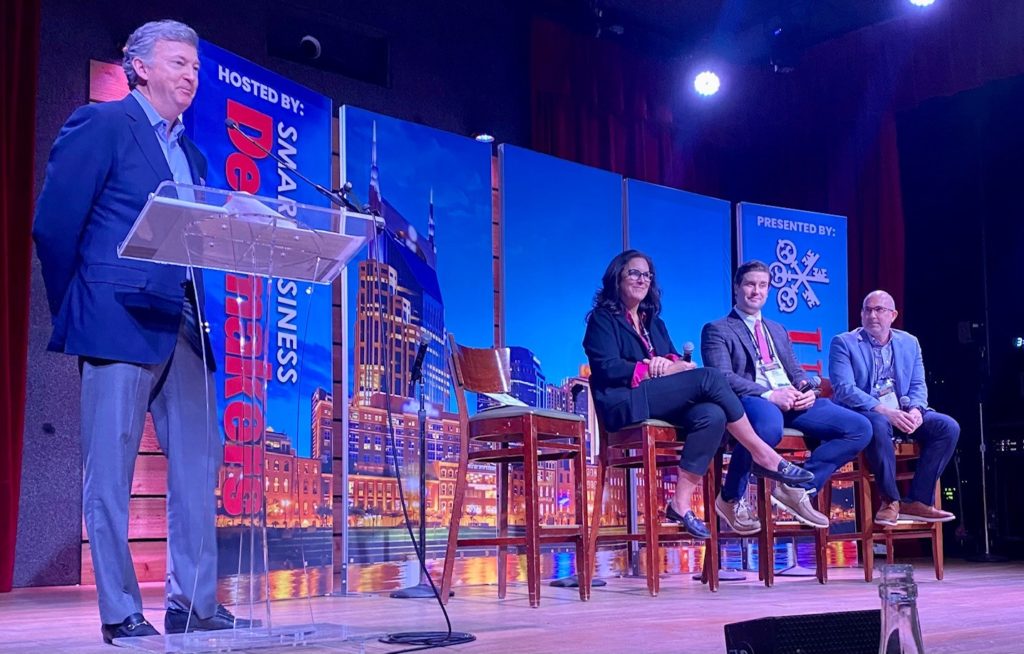On March 23, Bass, Berry & Sims once again sponsored and participated in the Smart Business Dealmakers conference in Nashville, Tennessee. The full-day conference included over 200 middle-market CEOs, top private equity and venture capital firms, major lenders, and leading service providers from across the mid-South region. Panel discussions featured topics focused on buy-side/sell-side dynamics, financing a deal, liquidity events, maximizing company performance and more.
Bass, Berry & Sims attorney Tatjana Paterno moderated a panel titled, “Exploring Exits: How to Evaluate Your Sell-Side Options,” which included Nick Cooper, Vice President at Council Capital; Kevin McGrath, Vice President at RiverGlade Capital; Tyler Morgan, Managing Director at Pinnacle Financial Partners; John Pontius, Director at Capital Alignment Partners; and Darshan Prabhu, Partner at Whistler Capital.

Bass, Berry & Sims attorney Howard Lamar moderated a panel titled “Transition or Sell: What to Do with Your Family Business,” which included Will Beard, CFO at Paladin Capital, Inc.; Alan Taylor, Partner at BKD, LLP; and Karen Doochin Vingelen, Senior Vice President – South Central Region at American Paper & Twine, a division of Imperial Dade.

The following are a few key takeaways from the discussions.
Exploring Exits: How to Evaluate Your Sell-Side Options
Demystifying Private Equity Exits
When selling owners accept rollover equity in a transaction (typically, 10-40% of the overall transaction proceeds), they want to know how soon it can be monetized and what factors drive the decision by the private equity partner to sell their portfolio companies. Panelists agreed that factors vary and depend on a particular situation, but generally, private equity firms ask some of the following questions when making their decision to sell a portfolio company:
- Has the portfolio company achieved the financial metrics established from the outset? Has it met investment objectives?
- What is the macroeconomic environment?
- What is the outlook for the industry in which the company operates?
- What is the market demand for this type of business?
Panelists noted that private equity firms typically involve management in the decision-making process with respect to a sale, so management should expect to be heavily involved in the decision-making process, however, “fund dynamics“ can override and drive diversities.
Rollover Equity
When a selling owner receives rollover equity, the owner should think like the buyers with respect to the post-closing company and should understand the equity position and relationship to the controlling owner. In particular, selling owners should address whether the rollover equity received in a transaction will be pari passu with the equity that the private equity partner receives, and if not, what the differences are. Owners should understand the post-closing company capital structure and that debt holders will also stay ahead of equity holders. Owners should also discuss with advisors and request certain minority protections that would be applicable with respect to their equity. These discussions may also reveal the culture and expectations of the private equity partner and create a better working relationship going forward.
Management/Acquisition Fees
Selling owners who receive rollover equity should also ask what management fees and/or acquisition fees the post-closing company should expect going forward. Many private equity funds charge their portfolio companies an annual management fee which could ultimately affect the value of the rollover equity. Panelists discussed the value that private equity sponsors bring to the table – such as acquisition support, introduction to opportunities, cross-pollination with other portfolio companies, as well as filling any talent gaps and bringing experienced board members. These things can supercharge the company’s growth and result in a successful exit for the private equity firm and the owner who rolled equity in the initial transaction. The panelists discussed several examples when the owners got a bigger payout when they cashed out their rollover equity (10-40%) than when they did their initial transaction and sold 60-90% of the company.
Transition to Sell: What to Do with Your Family Business
Multiple Drivers to Sell-Side Decision
Several factors influence the sell-side decision in today’s current market, including:
- The abundance of capital in the marketplace.
- The modern scale of business requirements in order to remain competitive, such as significant capital and business costs.
- The blending of global, national and regional playing fields – the notion of “local business” is often a thing of the past.
- The sheer dollars being spent to acquire family businesses – “multiples” have been sizeable.
Family Dynamics Are Complex
Often, many of the dynamics in the family business are driven by multigenerational involvement – each of whom typically has different expectations and needs. Succession plans need to factor into whether the family has proper leaders for the future. In addition, consideration needs to be made for both the active and non-active participants within any given family. Legacy and preservation of the “family name” can drive certain decisions and carry cultural importance to families.
ESOPs (Employee Stock Ownership Plans)
ESOPs are a potential option that can be considered for families and owners who want to consider additional exit strategies beyond mergers and acquisitions or passing ownership to future generations. This option can provide an ownership transition to a trusted employee base, and owners can often remain on as leading operators after “monetization.” There are certainly upsides and tax benefits – post deal – to this option, however, it does require regulatory engagement (Department of Labor), third party trustees and appraisals for “fair value” to protect employee-owners.
Put Building Blocks in Place to Build a Great Team
This includes both internal and external third-party advisors. From strong management to trusted legal counsel, independent accountants (and Quality of Earnings provider), investment bankers, and other professional services providers. Surround yourself with those who can support you as you operate day to day in your current job of managing your business while preparing for the company’s next steps. Be prepared if you launch a sale process – be organized, know your weakness, and have full diligence prepared.
Life on the Other Side
Properly prepare yourself for your new role with a “boss” and as an “employee.” Recognize you can support and “promote” your people and utilize the new owners’ capital to expand and improve. Anticipate that there will be curve balls and the future won’t be perfect but you will learn a lot – and you will have monetized all or a significant portion of your ownership.
If you have any questions about any of the topics covered above, please contact Tatjana Paterno or Howard Lamar.


